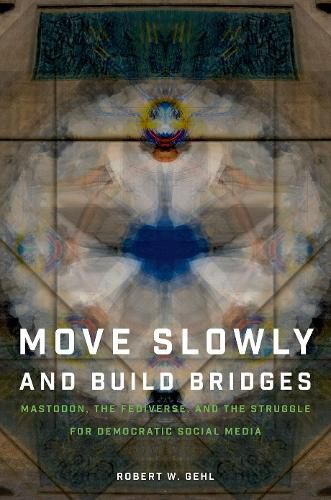Readings Newsletter
Become a Readings Member to make your shopping experience even easier.
Sign in or sign up for free!
You’re not far away from qualifying for FREE standard shipping within Australia
You’ve qualified for FREE standard shipping within Australia
The cart is loading…






Move Slowly and Build Bridges tells the story of activists, software developers, artists, and everyday people who have built the fediverse -- a large, noncentralized, alternative social media system. In contrast to big tech corporations like Meta, TikTok, or X, the fediverse is comprised of thousands of small, independent communities who use a powerful internet protocol to communicate with one another. These small communities can govern themselves and moderate content at the human scale -- in stark contrast to the global and advertiser-friendly interests of Meta or X.
The Mastodon network is perhaps the most notable and successful platform in the fediverse. Founded in 2016, Mastodon has positioned itself as an alternative to Twitter -- one that can be completely under the control of its members, from it to its daily operations to it underlying software.
Making a noncentralized, ethically-run social media system is no easy task. The people building the fediverse have faced burnout, bigotry, angry debates, and death threats. And they face constant, nagging doubts: can we really do this? Can noncentralized social media survive? Can we -- all of us -- have our own social media? In this thoroughly researched book, Robert W. Gehl argues that the answer is yes -- but it won't be easy.
$9.00 standard shipping within Australia
FREE standard shipping within Australia for orders over $100.00
Express & International shipping calculated at checkout
Move Slowly and Build Bridges tells the story of activists, software developers, artists, and everyday people who have built the fediverse -- a large, noncentralized, alternative social media system. In contrast to big tech corporations like Meta, TikTok, or X, the fediverse is comprised of thousands of small, independent communities who use a powerful internet protocol to communicate with one another. These small communities can govern themselves and moderate content at the human scale -- in stark contrast to the global and advertiser-friendly interests of Meta or X.
The Mastodon network is perhaps the most notable and successful platform in the fediverse. Founded in 2016, Mastodon has positioned itself as an alternative to Twitter -- one that can be completely under the control of its members, from it to its daily operations to it underlying software.
Making a noncentralized, ethically-run social media system is no easy task. The people building the fediverse have faced burnout, bigotry, angry debates, and death threats. And they face constant, nagging doubts: can we really do this? Can noncentralized social media survive? Can we -- all of us -- have our own social media? In this thoroughly researched book, Robert W. Gehl argues that the answer is yes -- but it won't be easy.